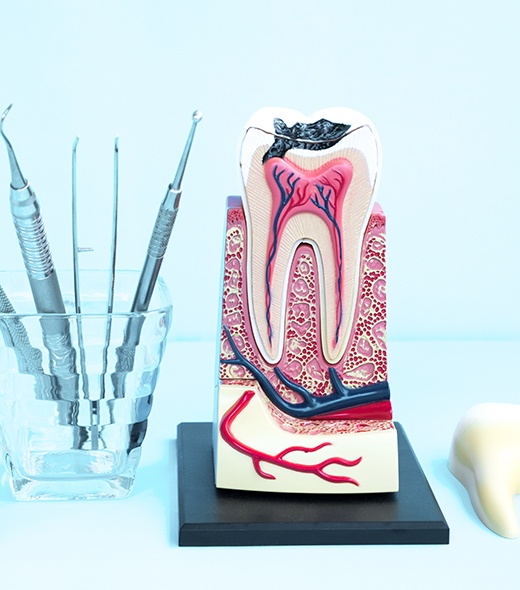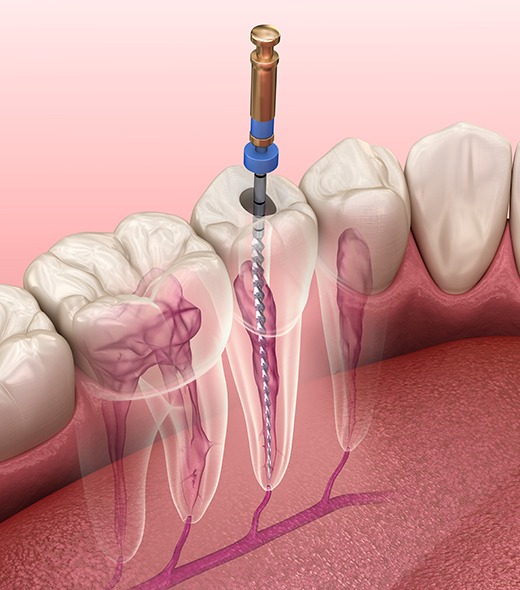Root Canal Treatment – Lubbock, TX
A Quick and Painless Way to Feel your Best!

If you’re dealing with an uncomfortable toothache, you should know that relief isn’t that far off. Many toothaches are caused by infections within the tooth, and if that’s the case for you, a root canal is a quick and painless way to feel your best! Depending on the complexity of the case, we may refer patients to a local specialist.
If you’re near Lubbock, TX, Kevin Shively, DMD, PLLC and his incredible dental team are here to help you. There’s no need to keep living with serious tooth pain; make an appointment with us today and we’ll make sure that you feel better in no time at all!
Why Choose Kevin Shively, DMD, PLLC For Root Canal Treatment?
- Dental Care Informed by Advanced Dental Technology
- Accept Patients of All Ages
- Welcomes Dental Insurance
Do I Need Root Canal Treatment?

Signs that you might need a root canal include persistent tooth pain, especially when chewing or applying pressure. You may also notice sensitivity to hot or cold that lingers after the temperature source is removed. If the tooth is discolored, or if your gums near the tooth are swollen, tender, or develop a small pimple-like bump, these are red flags. In some cases, a deep cavity or previous trauma to the tooth can lead to infection, which requires root canal treatment. If you experience these symptoms, it's essential to seek a dental evaluation from us to determine if a root canal is necessary to save the tooth and prevent further infection.
The Root Canal Process

A root canal is a procedure we use to save an infected or damaged tooth. It starts with numbing the area to ensure you're comfortable. We then create a small opening in the tooth to access the infected pulp inside. Using special tools, we clean out the pulp and shape the root canals. Once cleaned, the canals are filled with a biocompatible material, typically gutta-percha, to seal them off. Afterward, we close the tooth with a temporary filling. You'll likely need a crown to fully restore the tooth's function and protect it long-term. The procedure is typically done in one or two appointments, and it can prevent the need for extraction.
The Benefits of Getting a Root Canal

Getting a root canal offers several benefits. First, it saves your natural tooth, preventing the need for extraction, which helps maintain your bite and overall oral health. By removing the infection, we stop the spread of bacteria, protecting surrounding teeth and tissues. A root canal also alleviates pain caused by infection or inflammation, restoring comfort and function to your mouth. Compared to extraction followed by an implant or bridge, a root canal is often more cost-effective and less invasive. Additionally, retaining your natural tooth helps preserve jawbone density and overall facial structure, which can be affected by tooth loss over time.
If you think that you might be in need of a root canal, don’t hesitate to reach out to us for an appointment. We can’t wait to meet you!
Root Canal FAQs
How Much Pain is Normal After a Root Canal?
Immediately after your root canal, you won’t feel anything because your mouth will still be numb. As you begin to regain sensation, however, some soreness and sensitivity are to be expected. To alleviate it, we recommend getting lots of rest, taking OTC pain medication as directed, and using a cold compress for 10 minutes at a time. Around the three-day mark, you should feel significantly better!
What Should I Do Before a Root Canal?
There are a few ways you can set yourself up for success both during your procedure and afterward. For example, wearing dark, comfortable clothes is preferable to wearing tight, sweaty workout attire. Picking up everything you need from the store beforehand (like OTC pain medication and soft foods) will also prevent you from having to go after your appointment when all you want to do is go home and rest.
Why Do I Need a Root Canal if My Tooth Doesn’t Hurt?
Since pain is such a well-known symptom of severe dental damage, patients are often confused why they need a root canal if they aren’t experiencing any soreness, discomfort, or sensitivity. In short, Dr. Kevin Shively takes a look underneath the surface with X-rays, and he also screens for other warning signs of trouble, including a pimple-like bump on your gums or dark discoloration on your enamel. In other words, the situation may not seem urgent, but that doesn’t mean it isn’t!
What Happens if You Wait Too Long for a Root Canal?
In short, the longer you wait, the more time the infection will have to spread. That’s why it’s important to get the restorative care you need right away, even if you aren’t in pain. If you don’t, then it will only be a matter of time until your tooth is damaged to the point where it can’t be saved, and the infection will spread to the surrounding teeth and gums. So, don’t take the “wait and see” approach; get an appointment on the calendar ASAP to have the look, health, and function of your tooth restored.
Can Root Canals Be Prevented?
Good news: committing to good oral hygiene habits can lower your risk of needing a root canal significantly. So, if you aren’t already, brush your teeth for two minutes twice a day. It’s also important that you floss and rinse with an ADA-approved mouthwash for 30-60 seconds to ensure that the space between your teeth gets cleaned and plaque is removed from along your gumline. Outside of that, adopt habits that benefit the health of your smile, like coming to our office every six months for a dental checkup and teeth cleaning.
Do Root Canals Make You Sick?
The myth that root canals make you sick stems from poorly designed research conducted back in the 1920s. Since then, the claims Dr. Weston Price made have been disproven. Despite this, people continue to forgo the essential restorative care they need. Ultimately, if you’ve heard something about root canal treatment – like it’s painful or it can cause cancer – the best thing to do is talk to your dentist! They can answer any questions you have, provide insight, and help you decide the best way to move forward.
